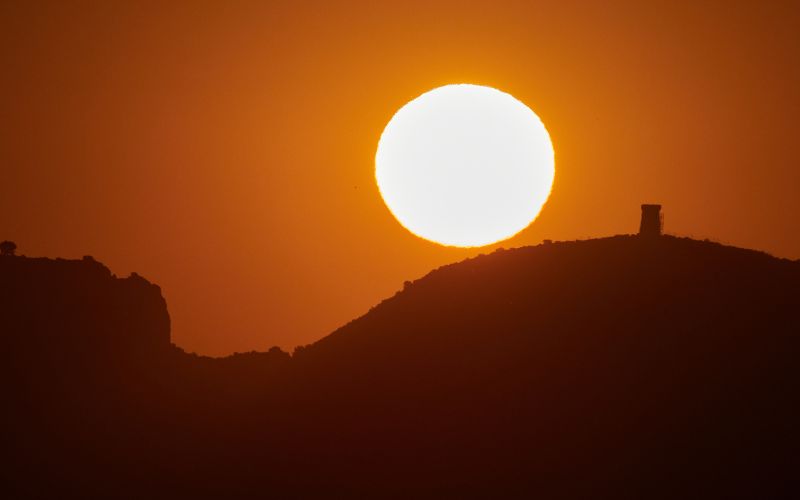
- Details
- By Kaili Berg
The summer solstice, occurring this year on June 21, marks the longest day of the year and the official start of summer in the Northern Hemisphere.
As the sun reaches its highest point in the sky, people around the world partake in various traditions and festivities to honor this astronomical event. However, for Native Americans, the summer solstice holds deeper significance that transcends contemporary customs.
The summer solstice is a result of the Earth’s axial tilt, which causes the Northern Hemisphere to receive the most direct sunlight. This results in the longest day and shortest night of the year.
The exact time of the solstice varies slightly each year due to the Earth’s elliptical orbit, but it typically falls between June 20 and June 22. This year, the solstice occurs on June 21, when the sun will reach its zenith at noon, creating the longest stretch of daylight.
In modern times, the summer solstice is celebrated with various activities. Many people flock to beaches, enjoy picnics, and partake in outdoor activities to soak up the extended daylight. Festivals, music events, and solstice yoga sessions are also popular ways to commemorate the occasion.
For Native Americans, the summer solstice is much more than just a day to enjoy the outdoors. It is a time of renewal, reflection, and spiritual significance. For centuries, indigenous peoples across North America have celebrated the solstice with ceremonies and prayer, viewing it as a sacred event that marks the beginning of a new cycle.
Among numerous Indigenous communities that celebrate the summer solstice, each has its distinct customs. For example, the Sioux hold a Sun Dance, a ceremonial ecent that includes dancing, singing, and drumming to honor the sun and seek spiritual renewal.
The Zuni people of the Southwest perform the Shalako ceremony, a series of dances and rituals that celebrate the arrival of summer solstice and the renewal of life.
In the Pacific Northwest, the Coast Salish tribes host gatherings that feature canoe journeys, where tribal members paddle long distances to meet with other communities. These journeys symbolize unity, strength, and the enduring connection to the waterways that sustain their way of life.
The summer solstice is a powerful reminder of the cycles of nature and the importance of living in harmony with the Earth. For Native Americans, it is a time to reflect on ancestral heritage, renew spiritual practices, and celebrate the interconnectedness of all life.
As we embrace the longest day of the year, let us also honor and learn from Indigenous cultural practices, appreciating the deep connections they foster between people and the natural world.
Here is a list of some notable summer solstice events around Indian Country:
- Smithsonian Solstice Saturday
- Return to the Heart Foundation: Summer Solstice
- Summer Solstice Sunrise Observance
Have a safe summer from Native News Online!
More Stories Like This
Gwich'in Tribal Governments Submit Comments Challenging Fish and Wildlife Service's Inadequate Environmental Review of Arctic Refuge Snow RoadRappahannock Tribe Challenges 9M-Gallon Water Plan
Feds release draft long-term plans for Colorado River management
Apache Leader Walks 60 Miles to Court Hearing That Will Decide Fate of Sacred Oak Flat
Rappahannock Tribe Raises Sovereignty and Environmental Concerns Over Caroline County Water Permit
Help us defend tribal sovereignty.
At Native News Online, our mission is rooted in telling the stories that strengthen sovereignty and uplift Indigenous voices — not just at year’s end, but every single day.
Because of your generosity last year, we were able to keep our reporters on the ground in tribal communities, at national gatherings and in the halls of Congress — covering the issues that matter most to Indian Country: sovereignty, culture, education, health and economic opportunity.
That support sustained us through a tough year in 2025. Now, as we look to the year ahead, we need your help right now to ensure warrior journalism remains strong — reporting that defends tribal sovereignty, amplifies Native truth, and holds power accountable.
 The stakes couldn't be higher. Your support keeps Native voices heard, Native stories told and Native sovereignty defended.
The stakes couldn't be higher. Your support keeps Native voices heard, Native stories told and Native sovereignty defended.
Stand with Warrior Journalism today.
Levi Rickert (Potawatomi), Editor & Publisher


